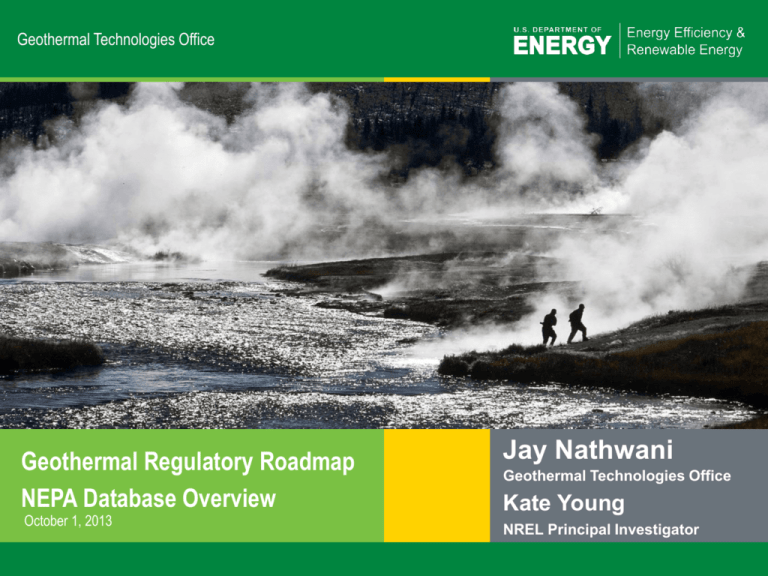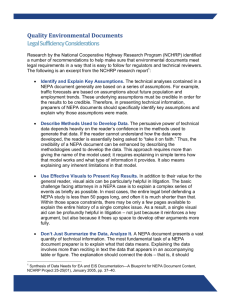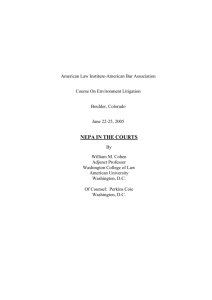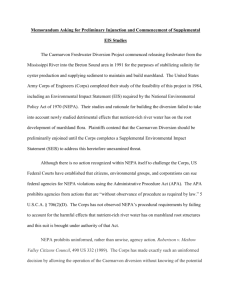1. NEPA Database
advertisement

Geothermal Technologies Office Public Service of Colorado Ponnequin Wind Farm Geothermal Regulatory Roadmap NEPA Database Overview October 1, 2013 1 | US DOE Geothermal Program Jay Nathwani Geothermal Technologies Office Kate Young NREL Principal Investigator eere.energy.gov Permitting Analyses: NEPA Data NEPA Data • Populating a catalog of more than 150 recent geothermal NEPA documents • Accommodates NEPA documents from all agencies, including: BLM, USFS, BOR, DOE • Includes all phases of development: Land Use Planning Exploration Well Field Power Plant Transmission • Information can be sorted, analyzed and compared by different criteria, such as by type of planned activity, by state or field office, by type of NEPA document 2 | US DOE Geothermal Program eere.energy.gov NEPA: List of Suggested Data to Collect Administrative Data • Agency (State, Office, Document Number/Serial Number, leases) Project Data • Applicant, Project Name, Project Type (Exploration, Drilling/Field Development, Utilization) Consultation, Special Interest and Concerns • Wildlife: Critical Habitat, Special Status Species • Cultural Resources • Visual Resources • Mitigation measures • Scope (brief narrative) Timelines/Action Dates Type of Analysis • • • • • Casual Use • Determination of NEPA Adequacy • Categorical Exclusion • Environmental Assessment • Environmental Analysis 3 | US DOE Geothermal Program Application date Public Notice Decision Processing Time eere.energy.gov 1. Provide data for future NEPA Analyses User Story BLM field office receives application for a reflective seismic survey. Agency personnel, including geothermal permit processing agent, specialists (biologist, cultural specialist, etc.) are unfamiliar with reflective seismic surveys or their potential impacts. Database Input • Users search for “reflective seismic survey.” • Basic information is provided about the survey, including how it is conducted, timeframes, output information, etc., • Links are provided for further information and potential “training” (videos, presentations, papers, etc.) • Lists of previous NEPA analyses conducted for reflective seismic surveys are listed, including dates, timeframes, locations, impacted species and stipulations Impact The collection of this information helps to: • Reduce misunderstanding about potential activity impacts • Provide consistency among NEPA analyses conducted for similar activities • Potentially reduce time required to determine impacts and stipulations 4 | US DOE Geothermal Program eere.energy.gov 2. Aid in Development of Categorical Exclusions Definition Categorical exclusion means a category of actions which do not individually or cumulatively have a significant effect on the human environment ... and ... for which, therefore, neither an environmental assessment nor an environmental impact statement is required. 40 CFR 1508.4 Note that a categorical exclusion can significantly reduce NEPA time requirements Typical CE Typical EA 3 months 10 months Categorical exclusions (CEs) are actions which meet the definition contained in 40 CFR 1508.4, and, based on past experience with similar actions, do not involve significant environmental impacts. They are actions which: do not induce significant impacts to planned growth or land use for the area, do not require the relocation of significant numbers of people; do not have a significant impact on any natural, cultural, recreational, historic or other resource; do not involve significant air, noise, or water quality impacts; do not have significant impacts on travel patterns; and do not otherwise, either individually or cumulatively, have any significant environmental impacts. 23 CFR 771.117(a) 5 | US DOE Geothermal Program eere.energy.gov 2. Aid in Development of Categorical Exclusions • Categorical exclusions (CX) are developed based on previous experience, so collecting information from existing geothermal NEPA documents for similar actions (e.g. specific exploration or drilling activities) can be the basis for development of categorical exclusions for geothermal. • CXs can be: • Implemented by administrative policies • Mandated by congress (Sec. 390 EPAct of 2005 for O&G) or through agency regulations. • Developed during land use planning process and within NEPA documents for multiple well and development projects, that provides for the use of individual CXs or determination of NEPA adequacy (DNA). • Providing the upfront data collection and analysis can provide the federal agencies the data needed for development of categorical exclusions. 6 | US DOE Geothermal Program eere.energy.gov Sources of NEPA Information Source Description of Available Data Type of Data Internet Search Some EAs and EISs were available via web search, largely because they were temporarily being made available for public comment EA and EIS reports NEPA Register BLM NEPA data base, records date from 2011, links https://www.blm.gov/epl-frontto CX, DNA, EA, and EIS documents, not complete office/eplanning/nepa/nepa_registe for all offices Selected NEPA documents LR2000 http://www.blm.gov/lr2000/ BLM serial register pages, case records for transaction records of leases, ROWs, NOIs for exploration, dates from 1970’s BLM Serial register pages with dates; no NEPA documents Individual field office websites NEPA documents, some offices from 2008, not complete for all offices, must know documents, no detailed list Geothermal project files, dates from 1980’s, most complete, must know documents for request BLM EAs and EISs open for public comment r.do Field office files DOE NEPA Database http://energy.gov/nepa/nepadocuments 7 | US DOE Geothermal Program BLM reports, Applications, FONSIs, decisions This database is reported to have a complete set of Reports, FONSIs, decisions, for data for DOE-led NEPA analyses from 2008 to the DOE projects present eere.energy.gov Summary of Information Collected # of Database Entries Applications (many are proprietary) Reports FONSIs Decisions Casual Use 26 18 19 NA 20 Determinations of NEPA Adequacy 27 1 27 NA 27 Categorical Exclusions 53 17 13 NA 53 Environmental Assessments 63 2 50 39 17 Environmental Impact Statements 5 5 NA 4 114 39 70 Type of Document TOTAL 8 | US DOE Geothermal Program 176 38 (not common) eere.energy.gov NEPA Database Queries Query Potential Uses Technique Users can look at the type of analysis typically needed for a given activity, and review previous timeframes and mitigation measures typically imposed. Development Phase Like the technique query, but on a broader scale, users can look at the type of analysis typically needed for a given development phase, and review previous timeframes and mitigation measures typically imposed. Field Office NEPA Analysis Type Users can review the analysis conducted at a field office and get a sense of the potential impacts and mitigation proscribed. Users can look at timeframes, techniques and other circumstances of NEPA analyses of a given type. This can help to target areas where efficiencies could be increased. Document Lists Users can see and access, at a glance, all NEPA-related documents available on OpenEIs Geothermal Area Users can see all NEPA analyses that have been conducted at a specific location, understanding mitigation measures and potential application of future tiered NEPA analyses such as DNAs. Users can look at mitigation measures proposed and imposed on previous projects for a particular resource. This may lead to greater consistency in mitigating impacts, as well as reduce time frames by not needing to re-invent mitigation measures for each project. Resource 9 | US DOE Geothermal Program eere.energy.gov OpenEI Demo http://en.openei.org/wiki/NEPA What links here Program Related changes 10 | US DOE Geothermal Upload file Special pages Printable version Permanent link Browse eere.energy.gov Upcoming Plans 11 | US DOE Geothermal Program eere.energy.gov






